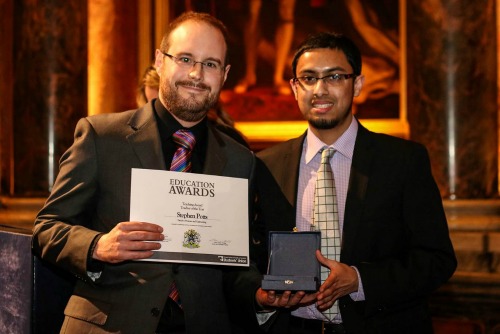Teaching awards triumph for SBCS
It was highly flattering to be nominated for Teacher of the Year in the 2015-16 Queen Mary Student Union (QMSU) Teaching Awards, especially as I’ve always held the belief that I was “just doing my job”. I was absolutely flabbergasted to have won and am extremely grateful to all the students who took the time to nominate me and other staff for the award.

This blog post is written by Dr Stephen Potts, Lecturer in Chemistry, who was recently voted Teacher of the Year by QMUL students.
It was a great honour for me and for the School of Biological and Chemical Sciences (SBCS). I would also like to salute Brendan Curran and Nathalie Lebrasseur, SBCS stalwarts who were also nominated for the awards of Teacher of the Year and Learning Resources Champion, respectively.
The teaching awards do not just include Teacher of the Year, but other prizes such as Assessment and Feedback Champion, Innovative Teaching Award, Postgraduate Research Supervisor of the Year and many more. The full list is available online and it is worth noting that support and admin staff are not left out. In January, QMSU invites students to nominate staff members for each category. For the vast majority of categories, it is not only the number of nominations received that guarantees the award, but also the nature of the accompanying comments. The comments related to my nomination were read out and are telling as to what students appreciate:
Not only does he care about his subject area of interest, but he also cares about all of us.
No lecturer I have met in my 4 years at QMUL has gone so far out of their way for others.
He encourages us to look beyond the scope [of the course material] and realise the maximum we can achieve.
It is clear that students like to feel valued and to be treated like human beings (that goes for lecturers too) and they like informative and fast feedback (especially if it’s face-to-face). We’re all pretty busy so living up to those expectations is a challenge.
Regarding feedback, it is important that the students’ expectations are managed about how and when feedback can be received (and even understand what feedback is). If I see that students need more time on a certain topic, I book a room for an hour to cover that material as an extra (but no more than this). Reading into the feedback supplied to the award committee, this is what students really appreciate. I include formative feedback through clicker use in lectures, with a prize for the student with the highest score at the end of the course, and make sure I address why the wrong answers are wrong. Furthermore, for technophiles, rapid turnaround of feedback can be achieved though QMplus. Ask students to upload their work as a PDF, download them in bulk, annotate them using a tablet or PDF annotator and then you can bulk upload back to the QMplus assignment. Providing you don’t change the file name, QMplus distributes the feedback files to the correct student and notifies them (if this is turned on). On the subject of QMplus, if you use quizzes, make sure you incorporate feedback in the questions.
In terms of the human side of the issue, I always try to talk to students and get to know them during breaks in lectures, workshops or labs. I try to remember their names; I recall when one student said to me “I’m just flattered you remembered my name”, and that really resonated with me. I found that knowing a bit about each student would allow me to personalise the feedback I gave and encourage them to do a bit more than just look at the course material. It is a balancing act of being serious when it matters but also having a sense of humour in lectures, especially if things go wrong.
Giving students a personalised experience and showing you care is more important than ever. It doesn’t have to take much effort, but it can make a huge difference.
More information
- Find out more about our Teaching Interest Group (TIGER)
- Read more about our Chemistry BSc or Chemistry MSci